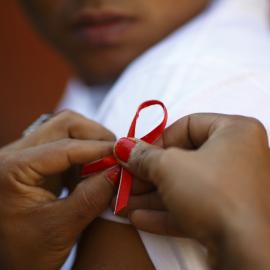To the Editor:
I have been following with great interest Foreign Affairs' discussion about Laurie Garrett's article on global health. But I am struck by the irony that a distinguished journal of foreign relations has completely missed such an important point: today's global health lacuna is political. We simply do not have people who are knowledgeable and experienced enough in foreign policy engaging in the politics of global health.
Most global health problems today are messy and do not remain strictly within the realm of health. The permission to manufacture cheap generic HIV/AIDS drugs, for example, is negotiated at the World Trade Organization long before those same drugs are made available to the World Health Organization. Some global health security decisions -- such as whether to fix Iraq's water mains first or its oil pipelines -- are made at the Pentagon. Some investments in maternal and child health in the world's poorest countries -- investments every public health professional knows will save hundreds of thousands of lives -- are nixed on the floor of Congress. In all these examples, public health and international affairs intersect.
Unfortunately, in the United States, international affairs and public health are taught separately at graduate schools. Schools of public health are not appointing faculty with expertise in international affairs. In fact, international politics in general is treated as a kind of no-go zone within most international public health curricula. Health should not be political, the rationale goes. Schools of international affairs are not any better, rarely including much health in their curricula or appointing health faculty knowledgeable about public health.
Even when public health curricula attempt to take on politics, the focus tends to be on U.S. domestic health policy, not foreign policy, where health is one of many competing concerns instead of the featured and privileged one. Public health folks too often take the naive position that the value of healthy populations -- both to individual societies and to the global community -- is self-evident and that they should not really have to work too hard to compete with other agendas. What is missing in global health today is a cohort of people who do not give up on the politics of global health but rather embrace it. We need people comfortable in the halls of power, maneuvering leaders in the service of global health. At a time when many of the most complex global health problems are mired in political quicksand, global public health is hindered by an expectation that health should not be political.
At a conference dinner in a European capital several years ago, I was seated next to a senior international lawyer. Cordial small talk brought us around to his expertise in international law and mine in global health. He became animated when I spoke of the global political economy of pharmaceuticals and interrupted to explain that he had been hired by one of the world's top-grossing pharmaceutical companies to sue India for supporting firms producing generic antiretrovirals for export. After about ten minutes of spinning out an elaborate plan about applying U.S. antitrust law to challenge India on the grounds of intellectual property rights violations (a plan that eventually succeeded), he asked my opinion on his chances for success. I said, "In the circles I work, the emphasis is on the millions of people dying, not on protecting the intellectual property rights of pharmaceutical companies." He turned to face me and, although I was braced for sarcasm, he said in all earnestness, "You know, for as long as I've been working on this, no one has ever said that to me before."
That conversation is a metaphor for the very real dangers of compartmentalizing global health education. How could a man in his position not have come in contact with someone who would point out to him the human and health dimensions of his litigation. But he had not and does not spend time with public health experts, and short of those of us who care about global health trying to make inroads into his world, it will remain that way.
Susan L. Erikson
Founding Director, Global Health Affairs, University of Denver
